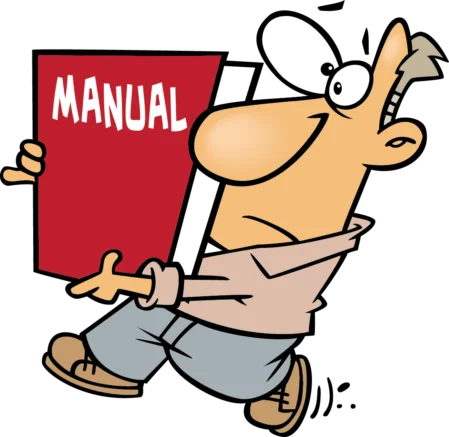Payroll Policies
Calculating Payroll

Payroll Policies
Now that we've covered the types of compensation and typical payroll deductions in prior lessons, we need to combine the two and throw in some additional concepts and practical examples to see how we actually perform payroll calculations. Our calculations also need to abide by any applicable federal or state laws.
The total earnings of an employee prior to any deductions is called gross pay or gross earnings. The gross pay minus the legal and authorized deductions is called net pay.
Our examples will include the major types of compensation such as salaries, hourly wages, piece rate wages, overtime, tips, and bonuses. In addition, our examples will illustrate how and where to get the information necessary to calculate the different types of payroll deductions. Additionally, we'll discuss any areas (earnings or deductions) where federal or state laws may apply.

Since the best way to learn about calculating payroll is actually doing, that's exactly the approach we're going to take. We're going to use a restaurant (Mom's Secret Recipes) as our example type of business so that we can also include some examples of tipped employees. For those businesses that don't have to deal with tips, the extra bit of knowledge won't hurt.
Payroll Assumptions and Rules regarding Mom's Secret Recipes:
- We're organized as a sole proprietorship.
- We'll use the rates for social security and medicare in effect for the year 2020.
Social Security - 6.2 % or .062
Medicare - 1.45 % or .0145
- We'll use the IRS's income tax withholding tables and calculations in effect for the 2020 year.
- We'll assume our state has a state income tax and that state income tax is withheld at a flat rate of 10% of gross pay.
Note:Actually states publish withholding tables and calculations similar to the IRS withholding tables.
- We live in a locality that has no city income tax.
- Our restaurant is subject to the Fair Labor Standards Act (FLSA) -minimum wage and overtime laws.
The Fair Labor Standards Act (FLSA) effective as of 2009 sets a federal minimum wage of $7.25 per hour for covered, nonexempt employees. An employer of a tipped employee is only required to pay $2.13 ($7.25 -5.12 tip credit) an hour in direct wages. If that amount plus the tips received equals at least the federal minimum wage, the employee retains all tips and the employee customarily and regularly receives more than $30 a month in tips. If an employee's tips combined with the employer's direct wages of at least $2.13 an hour do not equal the federal minimum hourly wage, the employer must make up the difference.
Note:Some states have minimum wage and/or overtime laws that differ from the federal law. When an employee is subject to both the federal and state wage laws, the employee is entitled to the provisions which provide the greater benefits.
- Our state as well as the federal government allows us a "maximum tip credit" of $5.12 and our state's minimum wage is the same as the federal minimum wage of $7.25. In addition, Ma and all our tipped employees comply with any additional federal laws.
Requirements to use the Tip Credit
The employer must provide the following information to a tipped employee before the employer may use the FLSA 3(m) tip credit:
1) the amount of cash wage the employer is paying a tipped employee, which must be at least $2.13 per hour;
2) the additional amount claimed by the employer as a tip credit, which cannot exceed $5.12 (the difference between the minimum required cash wage of $2.13 and the current minimum wage of $7.25);
3) that the tip credit claimed by the employer cannot exceed the amount of tips actually received by the tipped employee;
4) that all tips received by the tipped employee are to be retained by the employee except for a valid tip pooling arrangement limited to employees who customarily and regularly receive tips; and
5) that the tip credit will not apply to any tipped employee unless the employee has been informed of these tip credit provisions.
- All our employees have signed an agreement where if the need arises where their earnings are not enough to cover all authorized deductions from their pay that we may require them to setup and deposit funds in order to cover these deductions or reimburse us each pay period that this situation occurs.
- Our chef and cooks salaries are based on a 45 hour work week. We do not dock salaries for days off or tardiness. In other words if our cooks and chefs work less than 45 hours we still pay them their full salary.
- Our restaurant pays 50% of a family's premium for health insurance and our plan qualifies with the IRS for tax-exempt treatment. The annual premium for our family plan is $5,200.
- We provide one week of vacation for all employees with at least 6 months of company service and two weeks for all employees with a year or more of company service. All our current employees qualify for two weeks.
- We provide 5 paid holidays a year for all employees with at least 6 months of company service. All our current employees qualify for the 5 holidays.
- We provide 5 sick days paid a year for all employees with over 6 months company service. All our current employees qualify for the 5 sick days.
- Our state requires a 30 minute "lunch" break for all employees scheduled to work more than 6 hours during a day. In addition, we provide two 10 minute paid breaks during the work day.
- We include any bonuses with regular wages. In other words we don't issue separate checks for bonuses.
- For the convenience of our employee's we administer an employee savings account and U.S. Savings Bond programs.
- We require our tipped employees to report their tips each week.
- We require all our employees to have "uniforms"- embroidered shirts with the our name and logo. We supply the first three at no cost and the employee is responsible for purchasing additional shirts that are lost or worn out. All our employees have signed a statement authorizing this "special" deduction.
- All our employees have been instructed about employee deductions and have signed our "blanket" employee deduction authorization form.
- All our food handlers are subject to periodic health exams. We pay 100% of the cost of these required exams.

What should you pick up from reviewing our assumptions ?
- We've established policies such as "special deductions".
- We've done our research to determine if any special requirements apply to our type of business- health exams for food handlers and tips must be reported by our tipped employees.
- We've done our homework as to what deductions are required by federal, state, or local laws.
- We've set up fringe benefits such as insurance and paid holidays and vacations - not required by law but we want to be competitive in attracting good employees.
- We've obtained "blanket" and "special" authorizations for deductions from our employee's pay.
- We used salary as the payment method for some of our nonexempt employees. Normally nonexempt employees are paid on an hourly or other basis but the labor laws also allow you as an employer to use the salary payment method for nonexempt employees if you want to. We based our chef and cook salaries on a 45 hour work week. This is perfectly legal although many small businesses don't realize it. We do however have to pay them overtime if they work over 40 hours during a week.
Employee Manual
Although not required, I recommend that even a small business with employees prepare an employee's manual (it doesn't have to be fancy) that contains your employee policies and prepare job descriptions. By doing this, everyone should know what to expect.

What's Next ?
Classifying Employees
